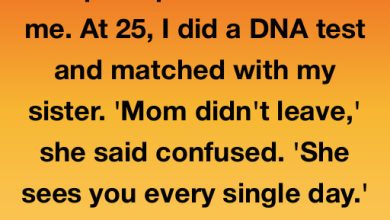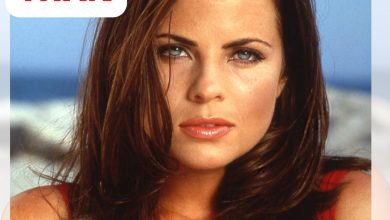An Unexpected Lesson from a Three-Year-Old
My wife’s birthday was coming up, and I wanted to get her a special gift. I decided to buy her the DVD of the movie “Titanic” because it was romantic and brought back some good memories. The story of Leonardo DiCaprio and Kate Winslet is one that many people love.
When my wife opened the present, our three-year-old son, Max, saw the movie case and asked a very serious question: “Can I watch it after nursery?”
Without thinking, I told him, “Not this one, buddy. That’s for grown-ups—just Mommy and Daddy.”
Later that afternoon, when I went to pick him up from school, his teacher was trying hard to hold back a laugh. She explained that all day long, from the very start of the day to the end, Max had been telling everyone that “Mommy and Daddy watch Titanic alone at night because it’s for grown-ups only.” I felt a little embarrassed and tried to explain things at the classroom door.
The teacher, with a playful look in her eyes, asked me, “Just to clarify, this Titanic… the ship?”
I nodded, my face feeling warm. “With Leonardo DiCaprio.”
She finally let out a big laugh. “Ah. We weren’t sure if it was… some other kind of Titanic.”
When I told my wife what had happened, she laughed so hard she almost fell off the couch. It became a funny story we would tell people to make them laugh.
But something more important started to happen. Max became very interested in the real story of the ship. He wasn’t focused on the movie, but on the history of the “Titanic.” He wanted to know everything. He asked many questions, like a tiny historian.
“What made it sink? Did anyone survive? Was there a slide? Was it like a pirate ship?”
Max started playing with his toys differently. His building blocks became big ships with smokestacks, and a shampoo bottle became a pretend iceberg. Bath time turned into a rescue mission with bottle caps as lifeboats. It was very sweet to watch, and his interest didn’t go away.
One evening while we were eating dinner, he asked me, “Daddy, why didn’t the captain see the iceberg?”
I tried to explain a difficult idea in a way a young child could understand. I told him, “Sometimes people think they’re in control when they’re not. They go too fast and don’t notice what’s ahead.”
He listened carefully and nodded, as if he was saving the thought for later. Then, he whispered, “I think that’s what happened to you and Mommy.”
I was surprised. “What do you mean, buddy?”
He looked at me with a calm, certain look. “When I was in Mommy’s tummy, you and her were going really fast. And you didn’t see your iceberg.”
His words were a jolt of reality. Max had been a surprise for us. We had only been together for a year when we found out we were going to be parents. We quickly got married, bought a house, and found steady jobs. We weren’t sad, but we were just busy. We were like two ships sailing side-by-side, but not really connecting.
That night, after Max was asleep, I told my wife what he had said. The smile on her face disappeared. “Oh,” she said softly.
We finally had the important conversation we had been avoiding for a long time. We talked about how we felt, not with anger, but with honesty. We realized we were not unhappy, but we felt separate from each other. We were moving too fast and missing what was important right in front of us.
We decided to make some small but important changes. I started leaving work early on Fridays and stopped checking work emails after dinner. My wife started painting again in the afternoons, and the house filled with the smell of art and coffee. We put our phones away more often. We started saying “yes” to walks and “no” to things that didn’t matter. These small changes helped us get back on the right track.
Max continued to be himself. The “Titanic” DVD was forgotten, but his mind moved on to other things like dinosaurs, volcanoes, and black holes. His questions were always very thoughtful.
At five years old, he asked, “Why do you smile when you’re tired?”
At six, he said, “Mommy, you should write a book about your dreams.”
At seven, he told us, “I think Grandpa visits me in my sleep. We talk without words.”
We called it his great imagination and left the hallway light on at night for him.
When he turned nine, we traveled to Halifax, Canada. We visited the Maritime Museum and saw the “Titanic” exhibit. Max became very quiet. He stood in front of a recovered deck chair and looked at it as if it were a person. He looked at a large map showing the ship’s last hours and said, almost to himself, “Here. This is where it happened.”
My wife was impressed. “Did you learn that at school?” she asked.
He shook his head. “I just know.”
Back at the hotel, he asked if he could finally watch the movie. He felt he was ready. We said yes. He watched the whole movie without moving, his eyes wide and his fists tight. When it ended, he said softly, “They were too proud. That’s why it sank.”
The next morning, I found a note he had written on hotel paper: “Even the largest ships need to be humble. Or else they will sink.” I put the note in my wallet and still carry it today.
Max grew into a thoughtful person. He loved books more than video games and preferred talking to people rather than just making noise. He made friends with our elderly neighbors. I once saw him in the yard with Mr. Holland, a man who didn’t talk to many people, and they were both laughing. Later, I asked Max what they talked about.
“He misses Mrs. Holland,” Max said. “He thinks no one remembers her. I told him to tell me everything. I said I’d remember.”
That winter, Mr. Holland passed away. At the funeral, when they asked if anyone wanted to speak, Max raised his hand. With shaking hands, he stood at the front and said, “I didn’t know Mr. Holland for very long. But I could tell he loved Mrs. Holland because his smile changed when he talked about her. I think she knew.”
Everyone in the room, including me, had tears in their eyes.
By the time Max was thirteen, my wife and I had also changed. We shifted our jobs and started volunteering. We made our lives simpler and focused on what was truly important. We learned to spot our “icebergs” before we ran into them.
Max joined a program where he helped younger kids, not because he needed help, but because he wanted to give it. One evening, I picked him up, and he was quiet in the car.
“How’d it go?” I asked.
“Good,” he said. After a pause, he added, “One kid’s dad left. I told him mine stayed.” He looked at me. “Sometimes staying is harder than leaving. Thanks for staying, Dad.”
I had to pull the car over. I couldn’t stop the tears.
High school and college passed by. Max studied psychology. He once told us, “People are like ships. Some drift. Some sink. Some anchor too deep. But all carry stories.”
On the day he graduated, he gave us a gift: a DVD case. When we opened it, it was the same copy of “Titanic” we had bought years ago. Inside was a note from him:
“Thank you for steering me through life—even when we couldn’t see the icebergs. —Max, your first crewmate.”
We hugged, we cried, and we laughed. That night, we finally watched “Titanic” again. It was just the two of us, and we weren’t in a hurry. We watched every moment of the film, and it felt like we were watching our own lives over the past decade. The times we almost made a mistake. The times we changed our direction. The quiet moments that saved us.
When the movie ended, my wife leaned on me. “Funny,” she said. “The thing that once made us laugh now feels like what brought everything full circle.”
Because sometimes an iceberg isn’t the end of the journey. Sometimes, it’s the moment you start steering with your heart.
If there’s a lesson to be learned, it’s this: don’t try to outrun the storms in your life. Don’t ignore the warnings just because everything looks good. Be humble, even when you feel like nothing can stop you. And never forget the simple wisdom of the young people who are watching you. They see more than we think.
If this story connects with you, feel free to share it. There might be someone out there heading toward an iceberg, and this could be the small push they need to slow down.
“Even the largest ships need to be humble. Or else… they will sink.”




